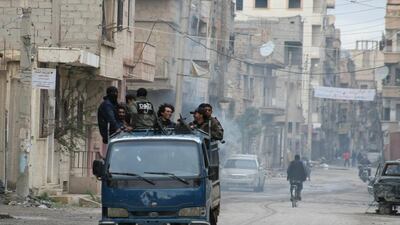Just as media attention has turned away from Syria, especially since the start of the war on Gaza, the conflict seems to have taken an important new turn, internally and externally. A series of developments has taken place in recent weeks that deserves a close look.
Internally, the Syrian opposition has either lost or is in danger of losing six of the provinces it once controlled. In Deir Ezzor, Raqqa and Hasaka, the Islamic State holds sway; in Deraa, once perceived to be the moderate opposition’s ready gateway into Damascus, Jabhat Al Nusra is slowly but surely consolidating its presence at the expense of the other forces; and the regime has taken Homs and is steadily making progress inside Aleppo, where it has taken the strategic area of Sheikh Najjar and is moving to encircle the rebels in much of the city.
Meanwhile, what was the rebels’ most powerful alliance, the Islamic Front, has now effectively disintegrated after two of its factions, Jaish Al Islam and Suqour Al Sham, declared a merger that excludes the other members.
Externally, the opposition's backers seem to have lost the appetite to even pretend that they support the rebels' cause. Although the United States and other backers still provide weapons to groups inside the country, albeit in a drip-drip manner, there is a sense that a compromise that favours the regime will be necessary. Even for the Gulf states, the opposition's most committed backers, the removal of Bashar Al Assad from power has become a low priority, compared to stemming the rise of radical forces.
Amid these developments, an increasing number of opposition figures, rather than directing blame exclusively to the regime, have called for an overhaul of the opposition’s demands towards the acceptance of some sort of compromise with the regime to salvage what is left of their country. These opposition figures include the former chief of the National Coalition, Moaz Al Khatib, who issued a statement last week calling for a peace settlement that excludes both the regime and the opposition, which he described as “hostage” to outside powers.
But despite this gloomy state of affairs, there are steps that the opposition and its backers can take to move away from the regime and the radical groups at the same time.
A series of events inside the country appears to have put the ball in the opposition backers’ court, especially in the Gulf. Earlier this week, 18 of the rebels’ major fighting groups issued a statement of unity, called wa’tasimo, or “work in solidarity”. The signatories represent the rebels’ different inclinations, from seculars to religious moderates, and exclude radical groups such as Ahrar Al Sham and Jabhat Al Nusra. What is particularly interesting is that the groups are supported by various backers – namely Saudi Arabia and Qatar – who often pit these groups against each other.
The rivalry among the opposition’s backers has undermined the rebels’ unity and led to catastrophic infighting. Support for certain moderate groups was conditioned on refusal to include or even work with certain Islamist groups. Some of these moderate groups have received advanced weapons, while other groups have suffered from a policy of financial blockade. This, along with the fighting with the Islamic State, is an important factor behind the flaking of large rebel alliances.
To be sure, the policy was necessary to reverse the dominance of Islamist forces within the rebels’ landscape, especially that the alliance of the Islamist forces rejected the moderate political and military structures of the opposition. They also called for unity under an Islamist framework, as happened in September when 13 disparate groups disowned the National Coalition and the Free Syrian Army. But this policy has to be nuanced, to ensure the military well-being of the opposition, especially at this juncture, and at the same time prevent the rise of Islamists at the expense of moderates. And now is a good time to do that.
All the 18 groups that have signed the latest unity statement oppose the radical groups that pose a threat to Syria and other countries in the region. Last month, the Islamic Front issued a rare, strongly-worded statement against Jabhat Al Nusra’s plan to establish an Islamic emirate in Syria. Also, the Islamic Front members Jaish Al Islam and Suqour Al Sham have formed a merger that excludes Ahrar Al Sham, the Islamic Front member that has links to Al Qaeda. Although the divorce is not yet official, the differences between the two camps have existed for months and cannot be salvaged.
The credit for these occurrences goes to the policy of opposing the dominance of Islamists, a policy by Saudi Arabia against groups supported by Qatar. It is safe to say that the majority of, if not all, the Syrian groups that fought jihadists in recent months were financially backed by Saudi Arabia. But the policy has been at the expense of the fight against the regime, and even against the fight against extremism given that the camp that opposed radical groups has been undermined by disunity. A more nuanced policy should follow a two-pronged strategy of curbing the dominance of Islamists within the opposition while working with all moderate Islamists to fight jihadists.
Hassan Hassan is a research associate with the Delma Institute in Abu Dhabi
On Twitter: @hxhassan

